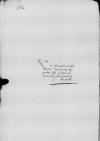Letter #2129
Ioannes DANTISCUS to Tiedemann GIESEHeilsberg (Lidzbark), 1539-04-01
English register:
Dantiscus discusses the planned reply to the Duke’s [Albrecht I von Hohenzollern-Ansbach’s] letter regarding the envoys to the [Royal Prussian] Diet. The opinion of the town councillors of Gdańsk (Danzig) and Elbing (Elbląg) is the same as his own. If the addressee and the [Prussian] lords do not hold a different view, he proposes that once they present him with their letter to the Duke, he will have his own messenger deliver it.
Dantiscus is outraged by reports on Alexander’s [Sculteti’s] doings. He is said to have returned to Frauenburg (Frombork) from Giese’s in a cheerful mood, dispatched mail to Rome, and also accused Dantiscus of unlawful action in writing to the [Ermland (Warmia)] Chapter. Alexander’s wife has no intention of leaving the house [belonging to the Chapter] despite the threat of excommunication (censurae).
Dantiscus cannot believe that Giese is more sympathetic towards Alexander than towards him. He reminds Giese of the benefits of having his friendship. He asks him not to break it off and to support him.
Dantiscus is doubtful whether his poem [Carmen paraeneticum ad Constantem Alliopagum] will be printed, but is sending an epigram that he added to it following Giese’s remarks.
| received 1539-04-04 Manuscript sources:
Prints:
| ||||||||
Text & apparatus & commentary Plain text Text & commentary Text & apparatus
Reverendissimo in Christo Patri et Domino, domino
Reverendissime in Christo Pater et Domine, frater et amice carissime et honoran(de) or honoran(dissime)⌈honoran(de)honoran(de) or honoran(dissime)⌉.
Salutem et fraternam commendationem.
Post cf.
Non possum mihi temperare, quin id, quod ad me cf.
Induci non possum, ut credam plus
Quamvis cf.
Quod reliquum est, coepto inter nos fraterno amori me commendo Dominationemque Vestram Reverendissimam diutissime feliciter valere cupio ex animo.
Dat(ae) or Dat(um)⌈Dat(ae)Dat(ae) or Dat(um)⌉
Reverendissimae Dominationis Vestrae frater integerrimus


 BCz, 245, p. 162
BCz, 245, p. 162